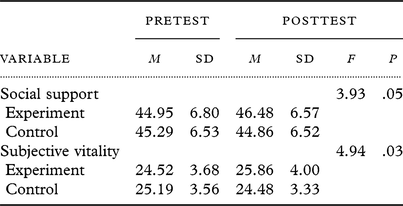Subjective vitality, the conscious experience of possessing energy and aliveness (Ryan and Frederick, Reference Ryan and Frederick1997), enables older adults to maintain a physically and socially active life, which can delay physical and cognitive decline associated with aging (Hertzog et al., Reference Hertzog, Kramer, Wilson and Lindenberger2008; Visser et al., Reference Visser, Hirsch, Brown, Ryan and Moynihan2015). Thus, exploring factors related to subjective vitality enhancement is crucial for maintaining physical and cognitive functions among older adults.
Social support has been observed to be positively correlated with subjective vitality among older adults (Carrapatoso et al., Reference Carrapatoso, Cardon, Van Dyck, Carvalho and Gheysen2018). When social support increases, subjective vitality also increases. Leisure can provide older adults with opportunities to interact with family and friends (Chang, Reference Chang2017). Leisure education, which refers to an organized program designed to improve the leisure attitudes, knowledge, and skills of participants and thereby allow them to use their leisure time more effectively (Sivan and Stebbins, Reference Sivan and Stebbins2011), may further help older adults receive social support because they are taught to identify people who can support them in pursuing their leisure goals and make clear requests for assistance (Searle et al., Reference Searle, Mahon, Iso-Ahola, Sdrolias and Dyck1995). However, an experimental study of the effect of leisure education on social support is lacking. Therefore, we conducted a pretest-posttest experiment to examine whether leisure education can help older adults receive social support and then enhance subjective vitality.
To examine the effects of leisure education on social support and subjective vitality, we recruited 42 older adults, aged 65–79 years, as participants. Their mean age was 69.24 years (SD = 4.27) and 69.00 years (SD = 4.01) in the experimental and control groups, respectively. Most of the participants were female and married and had completed primary school. Statistically significant differences were not observed in the demographic variables between the experimental and control group participants.
The participants were assigned to either an experimental group (n = 21) or a control group (n = 21). The leisure education program of Chang (Reference Chang2014), a modified form of the program by Searle et al. (Reference Searle, Mahon, Iso-Ahola, Sdrolias and Dyck1995), was adopted for the intervention. The program comprised the 12 units. Each of the 12 units comprised a variety of activities, such as role-playing and discussion exercises. We delivered all the units and demonstrated the activities in our school. The experimental group participants attended the unit lectures and completed all units together. The intervention was conducted twice per week for 12 weeks. The participants spent approximately 2 hr completing each unit.
All participants underwent a pretest to measure their social support and subjective vitality. Social support was measured using the 16-item scale of Chang (Reference Chang2017). Subjective vitality was measured using the 7-item scale of Ryan and Frederick (Reference Ryan and Frederick1997). The experimental group then participated in the leisure education program. All participants underwent a posttest after the program ended.
The pretest data from the experimental and control groups were used as covariates, and the differences between the two groups in the posttest data were examined using an analysis of covariance.
The results indicated that the average posttest scores for social support (F = 3.93, p = .05) and subjective vitality (F = 4.94, p = .03) in the experimental group were significantly higher than those in the control group when the pretest data of these two groups were used as covariates (Table 1).
Table 1. Differences in social support and subjective vitality

The scores of the social support scale ranged from 16 to 80. Higher scores indicated higher social support. The scores of the subjective vitality scale ranged from 7 to 35. Higher scores indicated higher subjective vitality.
The results were consistent with the findings of Carrapatoso et al. (Reference Carrapatoso, Cardon, Van Dyck, Carvalho and Gheysen2018) and Searle et al. (Reference Searle, Mahon, Iso-Ahola, Sdrolias and Dyck1995). Although the sample size of our study was small, the sample size in previous leisure education studies (Chang, Reference Chang2014; Searle et al., Reference Searle, Mahon, Iso-Ahola, Sdrolias and Dyck1995) was not significantly larger. Thus, the results were believed to confirm the positive effects of leisure education on social support and subjective vitality among older adults.
The results have crucial implications. The population of older adults is rapidly increasing. Successful aging depends on remaining engaged in an active life. Subjective vitality enables older adults to maintain a physically and socially active life (Hertzog et al., Reference Hertzog, Kramer, Wilson and Lindenberger2008; Visser et al., Reference Visser, Hirsch, Brown, Ryan and Moynihan2015). Therefore, enhancing subjective vitality among older adults is crucial for successful aging.
For promoting subjective vitality, older adults pursue activities that satisfy social support need (Carrapatoso et al., Reference Carrapatoso, Cardon, Van Dyck, Carvalho and Gheysen2018). Increasing social support satisfaction is an effective method for enhancing subjective vitality. Through leisure education, older adults can be given social support by teaching them to identify people who can help them in pursuing their leisure goals and to make clear requests for assistance (Searle et al., Reference Searle, Mahon, Iso-Ahola, Sdrolias and Dyck1995). We addressed social support in the leisure education program. Therefore, the intervention enhanced social support and subjective vitality among the participants. We suggest that encouraging older adults to participate in leisure education should be essential for enhancing social support and subjective vitality.
Conflict of interest
None.
Description of authors’ roles
Chang and Kao equally contributed to this work. Chang developed the program. Chang and Kao conducted the experiment. Kao gathered data. Chang analyzed data. Chang and Kao drafted the manuscript. Both authors read and approved the final manuscript.



